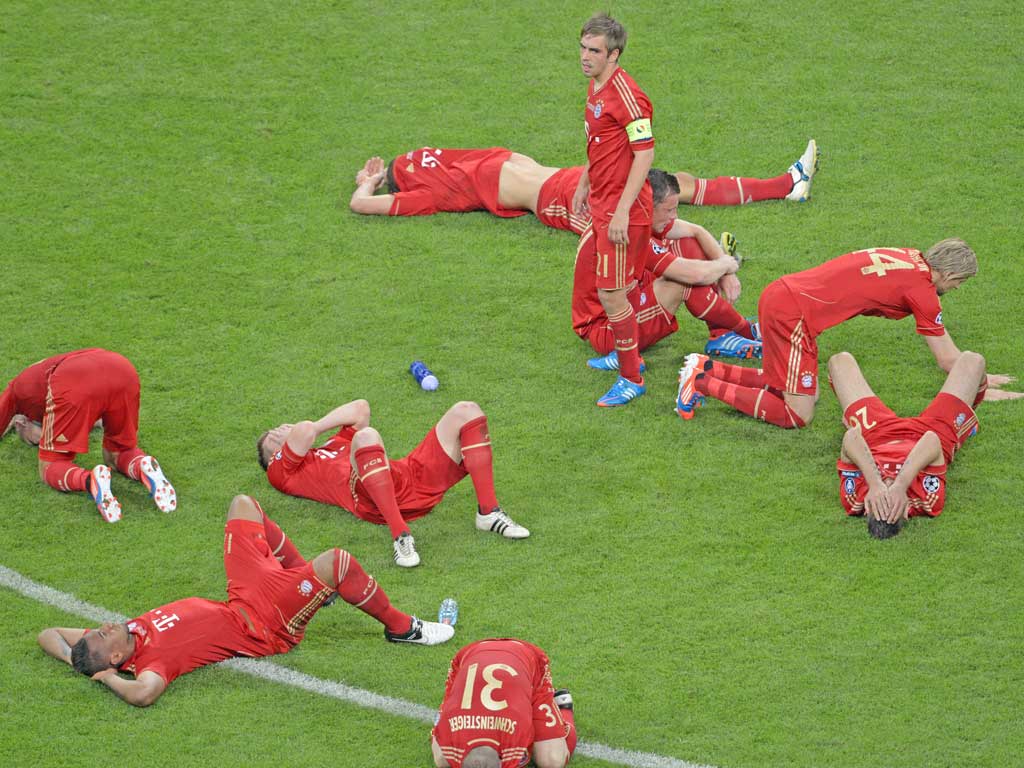Your support helps us to tell the story
From reproductive rights to climate change to Big Tech, The Independent is on the ground when the story is developing. Whether it's investigating the financials of Elon Musk's pro-Trump PAC or producing our latest documentary, 'The A Word', which shines a light on the American women fighting for reproductive rights, we know how important it is to parse out the facts from the messaging.
At such a critical moment in US history, we need reporters on the ground. Your donation allows us to keep sending journalists to speak to both sides of the story.
The Independent is trusted by Americans across the entire political spectrum. And unlike many other quality news outlets, we choose not to lock Americans out of our reporting and analysis with paywalls. We believe quality journalism should be available to everyone, paid for by those who can afford it.
Your support makes all the difference.You did not have to speak German to understand the headline that confronted readers of Germany's biggest-selling newspaper. "Schock Nacht in München" was how Bild described how a crown had been stolen from a coronation.
When it was all over, the cameras lingered on the face of Uli Hoeness, Bayern's president. Two years ago, when it was announced that his club would stage the 2012 European Cup final, he had delivered what those present described as an "I have a dream" speech. Nothing would be allowed to stand in the way of what appeared to be Bayern Munich's destiny. When it seemed Bayern might not even qualify for this season's competition, the manager Louis van Gaal was sacked and the older, more reliable figure of Jupp Heynckes was brought back in.
Hoeness drew a deep breath and was then embraced by his wife, Susanne. In the space of several weeks he had seen Bayern's season disintegrate. As the Bundesliga went into its winter break they had led, only to be overhauled by the team who have proved their recent nemesis, Borussia Dortmund. A few years ago Bayern loaned Dortmund money, so they could pay off huge debts.
Then came the disaster of the German Cup final, which Dortmund won 5-2.
This, however, was different. As the Allianz Arena was turned into a banner-waving rally, to the sound of the Bayern battle hymn, "Stern des Südens", it seemed Hoeness could not have asked for easier opponents. They had expected to face Barcelona – instead it was the Premier League's sixth-best team. Afterwards, Hoeness seemed incredulous.
"You cannot say it is OK to come second three times," he said. "I could accept it if we finished second once but not this." He pledged €60m (£48.5m) to start the rebuilding.
However, European Cups do not run to any concepts of destiny. In 1997 Alex Ferguson appeared convinced Manchester United would win the trophy because the final was in Munich, with all its terrible associations. Dortmund beat them in the semi-finals. "I don't know how long it will take me to recover," Ferguson said.
That night in Munich Philipp Lahm, Bayern's captain on Saturday, was a ball boy. This will cast a very long shadow over the club Lahm joined at the age of 11. There will be other finals but never again for this generation in their own stadium. They had lost the shoot-out from a 3-1 lead, in what was dubbed a "penalty thriller" by Bild.
On the day of the match Bayern published an open letter to "football fans across Germany". They promised to fulfil their dreams – instead the pledges lie ripped and discarded like the giant banner that proclaimed "Our City, Our Stadium, Our Cup". This, surely, was too much pressure. When Thomas Müller scored in Bloemfontein to humble England in the World Cup in 2010, his celebrations were ordinary. Here, after he scored, his face appeared contorted by both joy and relief, emotions that were to be snatched away.
In the 1990s, when the German game was at its most successful, Gary Lineker remarked that "football is a game that lasts 90 minutes and the Germans win". Not any more. Nationally and at club level, Germany presents young, attractive football that falls at the final hurdle.
Germany have finished third, second and third in successive World Cups and European Championships. This was Bayern's second loss in a European Cup final in three years. The Bundesliga was always the most attractive of the major leagues but it lacked money. A vast new deal from Sky, signed just before the final, ensured that you could taste the confidence.
As Bayern's fans, mostly young, mostly in remarkably good spirits, streamed back on to the U-Bahn that ran through the night – something unlikely to happen at Wembley next May – the stations still carried the club's adverts. A picture of Franck Ribéry, captioned "My Time Is Now". Their time came and now it is gone.
British cup winners
5: Liverpool 1977, 1978, 1981, 1984, 2005
3: Manchester United 1968, 1999, 2008
2: Nottingham Forest 1979, 1980
1: Aston Villa 1982; Celtic 1967; Chelsea 2012
Germans on the spot
* Bayern's failure in a penalty shoot-out was an extremely rare occurrence. The reunified national side have both of their shoot-outs, while Bayern won the 2001 Champions League from the spot. Before Saturday the main exception was West Germany's defeat against Czechoslovakia in the Euro '76 final.

Join our commenting forum
Join thought-provoking conversations, follow other Independent readers and see their replies
Comments